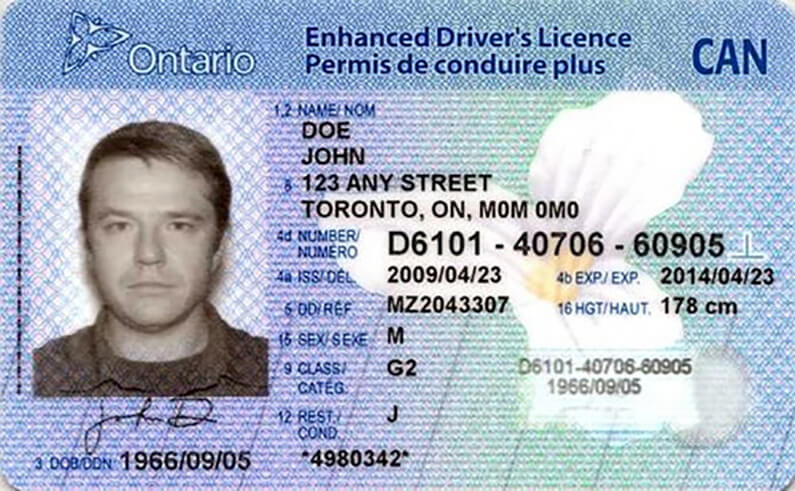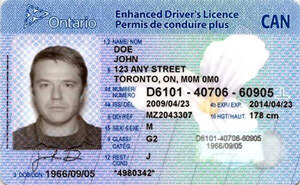Ontario G1 Road Rules Practice Test

| How many questions: | 20+20 |
|---|---|
| How many correct answers to pass: | 16+16 |
| Pass mark: | 80% |

As soon as they turn 16, residents of Ontario can enter the Graduated Licensing System, which is designed to help new drivers build their skills progressively. As you begin your learning phase, you must master the various aspects of driving theory before you can obtain a G1 licence and practise driving under the supervision of a fully licensed driver. The official G1 knowledge exam consists of 40 multiple-choice questions based on the official Ontario driver’s handbook. To pass, you must score 80% or higher before the timer runs out. We’ll help you ace this exam on your first attempt, but you must devote the time and effort necessary to complete your learning phase.
Our Ontario G1 Road Rules practice test focuses on the rules of the road section of the official exam. All 50 questions have multiple answer choices, but only one is correct. You will practise on the latest version, as this tool has been recently updated for November 2025. On the left side of the page, the “Test settings” menu gives you access to several features. Use them to customize your experience and make studying easier. By pressing the “Shift + ?” key combination, you can display a list of keyboard shortcuts. Use these shortcuts to provide flexibility to your training sessions and control the practice test with your keyboard. Have you ever wanted to know how other students answered these questions? The answer popularity function can give you valuable insight into common misconceptions. Difficult questions often have a wide distribution of answer choices. By enabling this feature, you can concentrate your focus on areas where you may need additional practice. Some of the most complex aspects of driving theory involve rules of the road, which some students struggle to understand. If you are unfamiliar with this subject, you can request personalized help from our automated assistant. You can initiate a conversation during your practice sessions and receive detailed explanations that clarify any confusion. Additionally, the AI coach can provide hints whenever you encounter a difficult question. Driving is a lifelong skill that cannot be improved overnight. We recommend dedicating the following weeks to mastering all aspects of driving theory, including road rules. Boost your learning potential and use the most efficient tools available. Becoming a safe and responsible driver in Ontario is a long and demanding process, but you can achieve it faster with consistency and perseverance.More tests
Easy
Hard
Hardest
Simulator
Behind-the-wheel
List of questions (classic view)
- You are in an intersection, waiting to turn left. If the light turns red while you are in the intersection, what should you do?
- What is the leading cause of skids?
- Are motorcycles, mopeds and bicycles entitled to the entire lane?
- When making a left turn from a one-way street, where should you be?
- What kind of sign is this?
- When parking on a downgrade, which way should you point your front wheels?
- According to this sign, how far is this interchange from the beginning of the freeway?
- How to improve the safety of pedestrians?
- If you have a G1-class licence, the driver accompanying you must
- When entering a highway, what should you do after you signal?
- When can a police officer request to inspect a motor vehicle?
- When emerging from an alley, driveway, private road, or building across a sidewalk or onto a street or highway, you must
- A broken yellow line at the left of your lane means
- If the traffic light changes while a pedestrian is still crossing the road, who has the right-of-way?
- Unless you are passing another vehicle or planning to make a left turn, where should you drive?
- What is the correct hand signal to indicate you are slowing down or stopping?
- If you hold a G1 licence, you may drive on 400-series highways or high-speed expressways
- If you are about to pass a bicycle to your immediate right and an oncoming vehicle is approaching you on your immediate left, what should you do?
- If you see a cyclist in your lane,
- What should you do to actively prevent collisions?
- Which of the following is the most important rule that G1 drivers must follow?
- Under any conditions of the road and weather, you should always drive at a speed that will allow you to stop within
- To upgrade your G1-class licence to G2, what must you do?
- If you have a G2-class licence,
- If you see a motorcycle in your lane and you would like to pass it,
- Check for motorcycles often because
- If a G1- or G2-licensed driver accumulates ____ points within a two-year period, his or her licence will be suspended.
- While driving in the right lane, you see a transit bus leaving the bus bay with its left-turn signals flashing. You should
- A vehicle equipped with flashing blue lights is
- Which of the following can result in being charged with dangerous or careless driving?
- What is the correct hand signal to indicate you are turning left?
- You are travelling on a two-lane road. If a vehicle ahead of you stops for a pedestrian, you must
- What minimum following distance should you maintain behind the vehicle in front of you?
- What is the correct hand signal to indicate you are turning right?
- When you are making a U-turn, the most important thing you need to remember is
- If a commercial motor vehicle breaks down on a freeway at night, flares or reflectors must be placed _________ both in front of and to the rear of the vehicle.
- You are following a commercial motor vehicle on a rural highway. At 80 km/h under good driving conditions, what is a safe following distance?
- If you are involved in a reportable collision, when do you have to report it to the police?
- When do you need to wear a seatbelt?
- If you are convicted of drinking and driving, your licence will be suspended for _______ for a first offence.
- Which blood alcohol concentration (BAC) can cause you to be convicted of impaired driving?
- Are you allowed to turn left at a red light?
- Where should your vehicle be positioned when you are turning right?
- The pavement is most likely to be slippery
- As you approach a curve, you should do which of the following?
- When your licence is reinstated after a 15-point suspension, the number of points
- When two vehicles reach an uncontrolled intersection from different roadways at about the same time, the vehicle _________ has the right-of-way.
- What does this sign mean?
- What does this pavement marking mean?
- Which of the following statements about three-point turns are TRUE?





